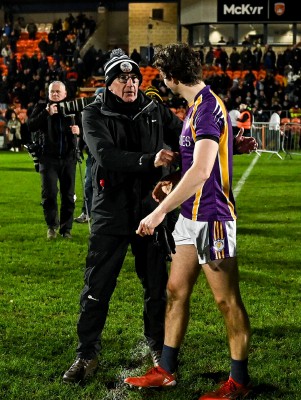THE Ulster Club final at the weekend saw Kilcoo run out comfortable winners against Derrygonnelly and they will now see themselves as favourites for the All-Ireland outright.
Someone at the game on Sunday asked me what currently separates them from the pack. For me it’s a very straight forward answer, they have a seriously high level for a club team of what you would call ‘game management.’
Game management is such a vital component in the modern game. I used to reference Dublin quite a bit when I referred to good practice and good game management, and despite losing their All-Ireland title, they are and were the best at it.
What we can do is learn from the best and try to evolve as best we can. Just in the same way rugby club and countries try to learn from the All Blacks, or in soccer from the likes of a Barcelona, or in hurling from a Limerick or a Kilkenny, we can do the same from these teams.
Having referenced the All Blacks, I actually remember reading a newspaper article not that long ago about rugby union in which Andy Farrell, the former England and current Ireland coach, spoke about the effectiveness of how the All Blacks manage the game.
“We have been in front against them and behind at critical stages in the game with teams I have been involved in and they are simply the masters at the comeback or staying in control, they stay calm and clinical regardless of the situation.”
Although this is an example from a professional sport at a really high performance end of sport, it is still very relevant.
Game management and understanding how to control a game in different circumstances is so important not just for adult players, but also younger players who are growing and learning in the sport.
You want to try and create situations in training that will expose the players to different types of pressure situations and allow them to develop the capacity to understand how to respond to these different challenges when they occur in games.
There are a number of ways you can implement game management into your coaching during training sessions. Coach the players how to react if they fall behind, how to control the pace of the game if needed or if they are in front how to protect their lead or further increase it.
Calls and signals can be an important part of game management. I was reading Jose Mourinho’s book a few years back of his first time with Chelsea when they dominated the Premier League. He talked about how during important games or times when they went in front, the call would be to rest on the ball, in other words take the sting out of the game.
Dublin were excellent doing it in big games or late on in games, just look at the likes of the 44 call from Jim Gavin’s side that signalled their three banks of four zonal press on kick-outs. Calls don’t have to be obvious, they can simply be a point, a clenched fist, a hand in the air or even a quick glance with the eye.
While coaching Carlow seniors a number of years ago we would have had about 12 or 13 calls we would have used, calls that originated from ideas that would have occurred in previous games.
Take, for example, a call we had in 2018 originating from the final game of 2017 against Monaghan. We called it ‘nine all, nine to go.’
So what happened in 2017? The game was a draw with nine minutes remaining and in the next five minutes Carlow had five big plays and kicked the ball away frantically in every one of them. With four minutes left Monaghan edged in front as we failed to seize control of the game.
So the idea behind the call was that when the players found themselves in similar territory the following season the call would trigger a response in the players’ heads during the game that would signal for them to control this game and take ownership of the ball.
In the final 10 minutes of the championship games that year against Kildare and Louth, we regularly called that in the closing stages, learning hard lessons from the previous year and finishing with a goal and a point in injury time to clinically close out the game.
In fact in the Louth game, one passage of play saw every player make contact with the ball resulting in a goal at the end of a large bout of controlled possession.
Other situations I like to create during training are placing teams in a particular situation with a clock on them.
For example, Team A in training are three points up and don’t start with possession, there are eight minutes on the clock, manage the game. Team A and Team B would get a couple of minutes before each scenario to chat among themselves and decide how best to approach the situation. If you don’t have big numbers, you can still simulate these situations on smaller condensed pitches, and bring the time limit right down to three- or four-minute games.
Pull the teams in after it and ask them to tell you what the other team were doing because then you are developing their thinking capacity to work out on field what the opposition are doing and how are you going to react because at crucial stages of games pressure creates panic.
Top teams like Kilcoo don’t do panic and any club side who can control the usually manic last moments of big championship games over will ultimately have the edge.
Receive quality journalism wherever you are, on any device. Keep up to date from the comfort of your own home with a digital subscription.
Any time | Any place | Anywhere












